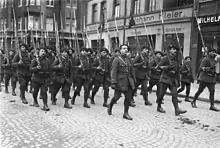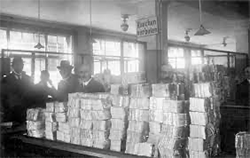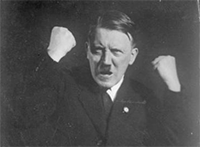The Rise of the Nazi Party
Part 2: Opportunism and Growth
The Great Depression hit in 1929, crippling the economies of Europe, the United States, and most other countries in the world. American banks had agreed in August of that year to another program to settle reparation debt, but the economic devastation was too great in America for such niceties to continue and so, in waves, American banks withdraw their lines of credit to German companies. Food and money were very much in large demand and short supply. Public trust in the government and in institutions plummeted. Lingering in the background still was large-scale resentment in some circles at Germany's assuming responsibility for being the aggressor in the Great War. (Faced with the prospective of more fighting with few resources to do it, the country had agreed to the harsh terms of the Treaty of Versailles, which contained the contentious War Guilt clause, which assigned to Germany all of the responsibility for starting the war, even though the war had many causes having nothing to do with German aims or hopes. 
In 1923, when the government admitted that it could no longer pay reparations, Belgian and French troops had occupied the Ruhr, a source of rich mining and manufacturing companies. Workers went on strike, and production plummeted. At one point, a citizens army swelled to 50,000 people and briefly took control of the Ruhr. The army took back control. In a similar vein were two coup attempts, the Kapp Putsch of 1920 and the Beer Hall Putsch of 1923. Both failed but illustrated the precarious hold that the government had on power. 
An election for president was set to happen in June 1920. War hero Paul von Hindenburg (right) put his name forward as a candidate and was a public favorite to win but didn't get to see himself elected because a military coup took control of Berlin and declared Wolfgang Kapp, a prominent government official, president. In the resulting civil unrest, a general strike led to violence in the streets and an uprising by Communist forces. The coup government collapsed, and troops arrested Kapp. He died in prison, awaiting trial for reason. A resurgent Reichstag extended President Friedrich Ebert's term of office for another five years. Then, in Munich in 1923 was the Beer Hall Putsch, an attempt by Adolf Hitler and members of the Nazi Party to take over the government. The coup attempt failed, and Hitler and war hero Erich Ludendorff were among those arrested; the former was convicted and sent to prison, and the latter was acquitted after claiming that he was an accidental participant. Ebert died in February 1925, and the government scheduled a new presidential election. No candidate got the necessary majority of the votes, so the government proclaimed a runoff. Hindenburg, despite garnering the fewest votes of any of the candidates, was the choice for the right-leaning political parties for the runoff. Hindenburg barely won the second election and was proclaimed President of the Republic. At 78, he took office, on May 12, 1925. As was the case with many world leaders, Hindenburg proved unable to maintain public confidence in the governments or its ability to solve the economic crisis brought on by the Great Depression. Unemployment Next page > Takeover and Crackdown > Page 1, 2, 3 |
|
Social Studies for Kids
copyright 2002–2026
David White



 Germany under the Weimar Republic prospered at first, hamstrung as it was by the very large amount of reparations needed to be paid to wartime enemies. Eventually, that amount of war debt became too much and Germany defaulted on its payments; coming to the rescue was a consortium of American bankers, who
Germany under the Weimar Republic prospered at first, hamstrung as it was by the very large amount of reparations needed to be paid to wartime enemies. Eventually, that amount of war debt became too much and Germany defaulted on its payments; coming to the rescue was a consortium of American bankers, who  skyrocketed, as did public discontent. Into this void stepped the Nazi Party. Hitler had served only nine months in prison for his role in the Beer Hall Putsch and found himself released in late December 1924. He went to work building up the influence-making apparatus of the Nazi Party.
skyrocketed, as did public discontent. Into this void stepped the Nazi Party. Hitler had served only nine months in prison for his role in the Beer Hall Putsch and found himself released in late December 1924. He went to work building up the influence-making apparatus of the Nazi Party.
